Expertise provided by Kevin Matthews from buildingbread.com
Interest rates play a role, in the economy influencing markets significantly. The financial sector includes banks and other financial institutions. Changes in interest rates directly impact it. This article examines how rising interest rates affect stocks. It looks at perspectives and offers insights on investing during rate hikes.
Relationship Between Interest Rates and Bank Stocks
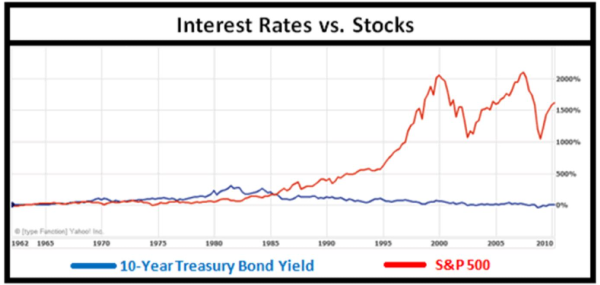 Source: Federal Reserve Bank
Source: Federal Reserve Bank
Shifts heavily influence banks in interest rates due to their business model. Banks generate revenue by borrowing at short-term rates and lending at long-term rates. Rising interest rates widen the net interest margin (NIM). This makes banks profitable.
Higher Loan Rates:
Banks can charge higher interest on loans. This boosts their interest income. For instance, if mortgage rates go up from 3% to 7% banks earn more from the loan amount.
Rising Deposit Rates:
Banks do have deposit interest costs. But loan rates generally grow more than deposit rates. This benefits banks' margins.
In essence an increase in interest rates can be advantageous for bank stocks long as the economy remains steady. There is no substantial surge, in loan defaults.
How Interest Rates Affect Financial Stocks
Rising interest rates affect banks. They also impact other financial sectors. These include credit card companies, insurance providers, and payment processors.
Credit Card Companies:
These businesses stand to gain from upticks in interest rates allowing them to collect fees on balances. This could result in a boost, in revenue from finance charges.
Insurance Companies:
Insurance providers invest the premiums. They get them from policyholders. They invest them into tools. Higher interest rates can increase the returns on these investments. This can boost insurance companies' profits.
Payment Processors:
During inflation, they may see more transactions. This will increase their revenue.
The Relationship Between Inflation, Interest Rates and Financial Sector Stocks
Inflation often triggers an increase in interest rates, which has an effect on financial sector stocks. The Federal Reserve usually raises interest rates. They do this to fight inflation. It does this by raising borrowing costs. This slows down spending and investment. Here's how this connection unfolds;
Inflation Rises:
As prices for goods and services rise inflation levels climb.
Federal Reserve Action:
The Federal Reserve raises interest rates to fight inflation. This makes loans and credit costly.
Impact on Financial Stocks:
Banks and other financial institutions benefit from interest rates. They gain more interest income if if economic growth remains steady and defaults do not spike.
Historical Performance of Financial Stocks During Rising Interest Rates
Looking at history, financial stocks have done well when interest rates rise. Let’s take a look at some instances;
1980s: In the era of inflation spanning the 1970s and early 1980s interest rates saw a substantial increase. At first, banks gained from the rate surge. But, their stocks took a hit in the recession that followed.
Early 2000s: In the 2000s interest rates were quite low. When the Federal Reserve began to raise rates, financial stocks initially did well. However, the financial crisis of 2008 caused a decline, in bank stocks.
2022: Moving on to 2022 the increase in interest rates resulted in revenues for banks and credit card companies. Still, worries about a downturn subdued investor hope.
The Relationship Between Interest, Stocks, and Bonds
Stocks:
Higher interest rates can lead to higher stock prices. This happens as borrowing costs rise and consumer spending slows. However, financial stocks often benefit from high rates. This is due to increased interest margins.
Bonds:
With an increase in interest rates bond prices usually drop. This is because new bonds are issued at rates making existing bonds with rates less attractive. This could mean returns for stocks. It also applies to bonds held by insurance companies and banks.
Do Bank Shares Go Up When Interest Rates Go Up?
Bank shares often rise when interest rates go up due to the following reasons:
Increased Profit Margins:
When interest rates increase it is common for bank shares to also increase. This is usually because higher interest rates let banks earn money on loans. The cost of deposits rises faster, leading to wider profit margins.
Higher Returns on Investments:
Also, banks and financial institutions see returns on their investments. They come from bonds and other assets that earn interest when interest rates are higher.
The positive effects of this situation rely on an economy. However, if interest rates increase rapidly or there are concerns, about a recession the advantages could be mitigated by defaults and decreased demand for loans.
Will Bank Stocks Go Down When Interest Rates Rise?
The movement of bank stocks in connection with rising interest rates can be influenced by factors;
Fear of Recession:
Investors worry that rising rates might cause a downturn. They might sell bank stocks due to worries about more loan defaults and less borrowing.
Higher Borrowing Costs:
High interest rates raise borrowing costs for businesses and people. This may reduce spending and investment. It could harm the economy and financial shares.
Pros and Cons of Rising Rates for Bank Stocks
The effect of rising interest rates on bank shares depends on the landscape and investor outlook. It has a big impact. Here are some advantages and disadvantages of rising rates for bank stocks
Pros
i. Higher Net Interest Margins:
Banks can make money from the gap between loan rates and deposit rates.
ii. Increased Interest Income:
Higher rates on loans and credit products raise revenues.
Cons
i. Economic Slowdown:
A rapid rise in rates could cause borrowing and spending to slow down. This could slow expansion.
ii. Increased Default Risk:
With an increase in default risk, banks may face loan defaults, which could have an impact on their profits.
Best Sectors for Rising Rates
Financial companies usually benefit. Rates are rising. Some sectors also thrive.
1. Energy:
Energy companies could profit from high prices. There's also lots of investment in energy infrastructure during inflation.
2. Utilities:
Utility companies have the power to raise prices on consumers.
3. Consumer Staples:
Companies in this sector provide essential goods and services. They do not depend on economic conditions and consumers continue to buy them.
Best Stocks for Higher Interest Rates
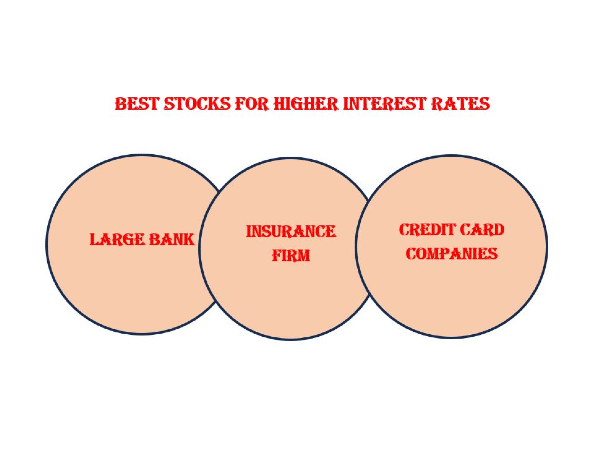
When interest rates go up it's an idea to look at stocks, from sectors that do well in this kind of situation;
• Large Bank: banks such as JPMorgan Chase, Bank of America and Wells Fargo tend to do when interest rates are higher.
• Insurance Firms: Insurance companies like MetLife and Prudential Financial can see profits from their investments.
• Credit Card Companies: Companies like Visa, Mastercard and American Express benefit from charging more on credit balances.
Top Investments for When Interest Rates Are Going Up
It's wise to look into these investment options during times of rising interest rates;
• TIPS (Treasury Inflation Protected Securities): These securities adapt to changes, in inflation safeguarding your purchasing power.
• Short Term Bonds: These bonds are less affected by interest rate hikes compared to long term bonds.
• Dividend Stocks: Dividend paying stocks are those, from companies with cash flows and the capacity to boost dividends over time.
How to Take a Position on Interest Rates
To capitalize on interest rate movements, investors have various strategies at their disposal;
Buy Financial Stocks: Concentrate on banks, insurance firms and credit card companies.
Invest in TIPS: Safeguard against inflation by choosing Treasury Inflation Protected Securities.
Short Bonds: Profits can be made from falling bond prices when rates increase by taking positions on bonds.
Use Interest Rate Futures: They allow speculation on future interest rate shifts.
Is It Wise to Buy Bank Stocks When Interest Rates Rise?
It can be a strategy if certain conditions are met;
• Stable Economic Environment: Banks can benefit from rates without a notable rise in defaults.
• Strong Loan Demand: Sustained borrowing activity bolsters bank profitability.
• Solid Fundamentals in Banks: Focus on banks, with balance
sheets and effective management.
Conclusion:
Rising interest rates have a deep impact on financial stocks, particularly banks. Higher rates can boost profits for banks and other financial entities. But they must understand the landscape. Investors need to keep in mind the chance of a slowdown, in the economy and higher rates of defaults. Diversify investments across sectors that gain from rising rates. Focus on stable companies and stay updated on economic signals. This can help navigate this tough environment well.
For more information watch this video:
https://youtu.be/JDPOUCNEJVc
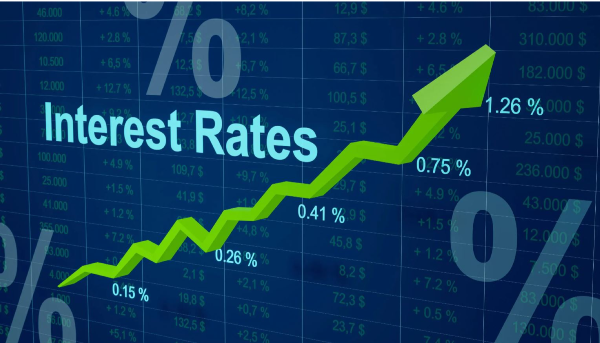



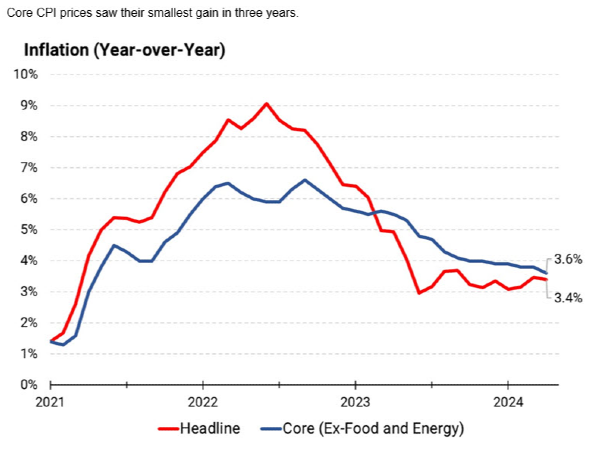






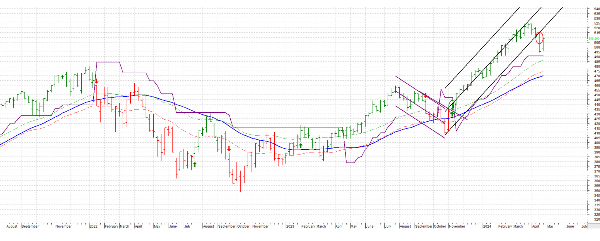


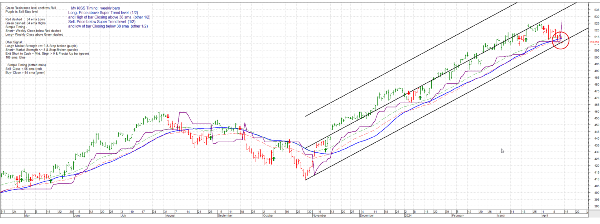




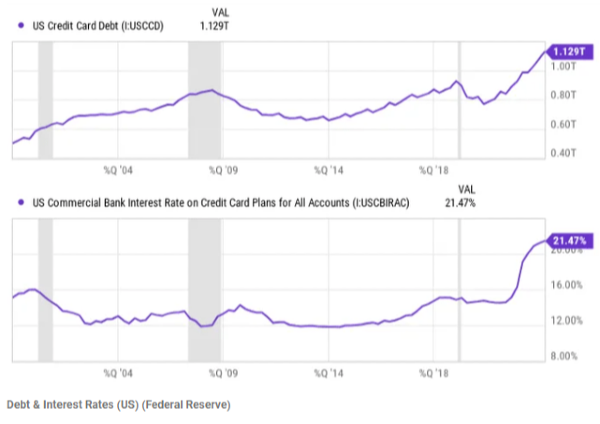










Expertise provided by Kevin Matthews from buildingbread.com
Interest rates play a role, in the economy influencing markets significantly. The financial sector includes banks and other financial institutions. Changes in interest rates directly impact it. This article examines how rising interest rates affect stocks. It looks at perspectives and offers insights on investing during rate hikes.
Relationship Between Interest Rates and Bank Stocks
Shifts heavily influence banks in interest rates due to their business model. Banks generate revenue by borrowing at short-term rates and lending at long-term rates. Rising interest rates widen the net interest margin (NIM). This makes banks profitable.
Higher Loan Rates:
Banks can charge higher interest on loans. This boosts their interest income. For instance, if mortgage rates go up from 3% to 7% banks earn more from the loan amount.
Rising Deposit Rates:
Banks do have deposit interest costs. But loan rates generally grow more than deposit rates. This benefits banks' margins. In essence an increase in interest rates can be advantageous for bank stocks long as the economy remains steady. There is no substantial surge, in loan defaults.
How Interest Rates Affect Financial Stocks
Rising interest rates affect banks. They also impact other financial sectors. These include credit card companies, insurance providers, and payment processors.
Credit Card Companies:
These businesses stand to gain from upticks in interest rates allowing them to collect fees on balances. This could result in a boost, in revenue from finance charges.
Insurance Companies:
Insurance providers invest the premiums. They get them from policyholders. They invest them into tools. Higher interest rates can increase the returns on these investments. This can boost insurance companies' profits.
Payment Processors:
During inflation, they may see more transactions. This will increase their revenue.
The Relationship Between Inflation, Interest Rates and Financial Sector Stocks
Inflation often triggers an increase in interest rates, which has an effect on financial sector stocks. The Federal Reserve usually raises interest rates. They do this to fight inflation. It does this by raising borrowing costs. This slows down spending and investment. Here's how this connection unfolds;
Inflation Rises:
As prices for goods and services rise inflation levels climb.
Federal Reserve Action:
The Federal Reserve raises interest rates to fight inflation. This makes loans and credit costly.
Impact on Financial Stocks:
Banks and other financial institutions benefit from interest rates. They gain more interest income if if economic growth remains steady and defaults do not spike.
Historical Performance of Financial Stocks During Rising Interest Rates
Looking at history, financial stocks have done well when interest rates rise. Let’s take a look at some instances;
1980s: In the era of inflation spanning the 1970s and early 1980s interest rates saw a substantial increase. At first, banks gained from the rate surge. But, their stocks took a hit in the recession that followed.
Early 2000s: In the 2000s interest rates were quite low. When the Federal Reserve began to raise rates, financial stocks initially did well. However, the financial crisis of 2008 caused a decline, in bank stocks.
2022: Moving on to 2022 the increase in interest rates resulted in revenues for banks and credit card companies. Still, worries about a downturn subdued investor hope.
The Relationship Between Interest, Stocks, and Bonds
Stocks:
Higher interest rates can lead to higher stock prices. This happens as borrowing costs rise and consumer spending slows. However, financial stocks often benefit from high rates. This is due to increased interest margins.
Bonds:
With an increase in interest rates bond prices usually drop. This is because new bonds are issued at rates making existing bonds with rates less attractive. This could mean returns for stocks. It also applies to bonds held by insurance companies and banks.
Do Bank Shares Go Up When Interest Rates Go Up?
Bank shares often rise when interest rates go up due to the following reasons:
Increased Profit Margins:
When interest rates increase it is common for bank shares to also increase. This is usually because higher interest rates let banks earn money on loans. The cost of deposits rises faster, leading to wider profit margins.
Higher Returns on Investments:
Also, banks and financial institutions see returns on their investments. They come from bonds and other assets that earn interest when interest rates are higher.
The positive effects of this situation rely on an economy. However, if interest rates increase rapidly or there are concerns, about a recession the advantages could be mitigated by defaults and decreased demand for loans.
Will Bank Stocks Go Down When Interest Rates Rise?
The movement of bank stocks in connection with rising interest rates can be influenced by factors;
Fear of Recession:
Investors worry that rising rates might cause a downturn. They might sell bank stocks due to worries about more loan defaults and less borrowing.
Higher Borrowing Costs:
High interest rates raise borrowing costs for businesses and people. This may reduce spending and investment. It could harm the economy and financial shares.
Pros and Cons of Rising Rates for Bank Stocks
The effect of rising interest rates on bank shares depends on the landscape and investor outlook. It has a big impact. Here are some advantages and disadvantages of rising rates for bank stocks
Pros
i. Higher Net Interest Margins:
Banks can make money from the gap between loan rates and deposit rates.
ii. Increased Interest Income:
Higher rates on loans and credit products raise revenues.
Cons
i. Economic Slowdown:
A rapid rise in rates could cause borrowing and spending to slow down. This could slow expansion.
ii. Increased Default Risk:
With an increase in default risk, banks may face loan defaults, which could have an impact on their profits.
Best Sectors for Rising Rates
Financial companies usually benefit. Rates are rising. Some sectors also thrive.
1. Energy:
Energy companies could profit from high prices. There's also lots of investment in energy infrastructure during inflation.
2. Utilities:
Utility companies have the power to raise prices on consumers.
3. Consumer Staples:
Companies in this sector provide essential goods and services. They do not depend on economic conditions and consumers continue to buy them.
Best Stocks for Higher Interest Rates
When interest rates go up it's an idea to look at stocks, from sectors that do well in this kind of situation;
• Large Bank: banks such as JPMorgan Chase, Bank of America and Wells Fargo tend to do when interest rates are higher.
• Insurance Firms: Insurance companies like MetLife and Prudential Financial can see profits from their investments.
• Credit Card Companies: Companies like Visa, Mastercard and American Express benefit from charging more on credit balances.
Top Investments for When Interest Rates Are Going Up
It's wise to look into these investment options during times of rising interest rates;
• TIPS (Treasury Inflation Protected Securities): These securities adapt to changes, in inflation safeguarding your purchasing power.
• Short Term Bonds: These bonds are less affected by interest rate hikes compared to long term bonds.
• Dividend Stocks: Dividend paying stocks are those, from companies with cash flows and the capacity to boost dividends over time.
How to Take a Position on Interest Rates
To capitalize on interest rate movements, investors have various strategies at their disposal;
Buy Financial Stocks: Concentrate on banks, insurance firms and credit card companies.
Invest in TIPS: Safeguard against inflation by choosing Treasury Inflation Protected Securities.
Short Bonds: Profits can be made from falling bond prices when rates increase by taking positions on bonds.
Use Interest Rate Futures: They allow speculation on future interest rate shifts.
Is It Wise to Buy Bank Stocks When Interest Rates Rise?
It can be a strategy if certain conditions are met;
• Stable Economic Environment: Banks can benefit from rates without a notable rise in defaults.
• Strong Loan Demand: Sustained borrowing activity bolsters bank profitability.
• Solid Fundamentals in Banks: Focus on banks, with balance sheets and effective management.
Conclusion:
Rising interest rates have a deep impact on financial stocks, particularly banks. Higher rates can boost profits for banks and other financial entities. But they must understand the landscape. Investors need to keep in mind the chance of a slowdown, in the economy and higher rates of defaults. Diversify investments across sectors that gain from rising rates. Focus on stable companies and stay updated on economic signals. This can help navigate this tough environment well.
For more information watch this video: https://youtu.be/JDPOUCNEJVc